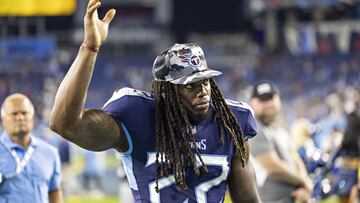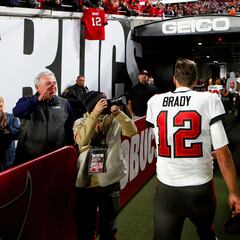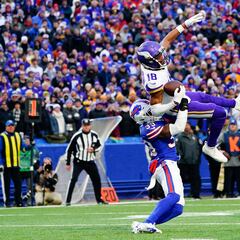Is the running back position going to disappear in the NFL?
Derrick Henry was one of many NFL players to come out and criticize NFL teams for not signing their franchise tagged running backs to long term deals.

Where there’s smoke, there’s fire. And the smoke still hasn’t settled in the aftermath of Saquon Barkley, Josh Jacobs and Tony Pollard not getting long term deals before the franchise tag deadline. Top RBs around the league took to social media to express their disappointment for their brothers in the running back community.
Backs not getting their bucks
The immediate backlash has been felt, as criticism continues to rain down on NFL franchises by some of its biggest stars. This might be the first flame in what could be a fire that spins out of control as teams get prepared to begin training camp this week.
Saquon Barkley, Josh Jacobs and Tony Pollard were all a part of playoff teams last year, and those teams reached the postseason in large part because of the work they did out of the backfield. Instead of getting a multi-year deal they have been slapped with a franchise tag which could very well could lead to player holdouts into the preseason, and perhaps as far as the regular season.
"It is what it is": Saquon Barkley responds to playing on $10.091M franchise tag in sixth season with Giantshttps://t.co/J1splgO3Cd pic.twitter.com/yiOnVxGLTZ
— Around The NFL (@AroundTheNFL) July 17, 2023
We know what a physical game football is, it’s what attracts us to it. It’s what keeps us glued to the TV for nine hours on Sundays, and all the other days that the NFL is featured during primetime throughout the months of September to February. No one knows that more than running backs who put their bodies on the line more than anyone else, at least on the offensive side of the ball.
End of the RB?
One of the most polarizing comments to come out in the wake of the news that broke on Monday came from the guy who has dominated the league at the running back position for the last half decade. Derrick Henry was extremely critical of all the franchises involved in not offering long term deals to their star ball carriers, and even suggested, condescendingly, that we scarp the running back position all together.
At this point , just take the RB position out the game then . The ones that want to be great & work as hard as they can to give their all to an organization , just seems like it don’t even matter . I’m with every RB that’s fighting to get what they deserve . https://t.co/OgvBWZCKvn
— Derrick Henry (@KingHenry_2) July 17, 2023
When you think about it logistically, he’s not far off with that hypothetical suggestion. Who is going to want to play running back? Why risk your body at a position that even if you produce the kind of numbers that these franchise tagged RBs produce, you are more than likely not going to get compensated.
A recent tweet that citied sportrac’s information claiming that the average salary for an NFL running back is almost half a million dollars less than the average salary of a kicker. This is a stunning stat when it comes to how much of the work load running backs get as opposed to kickers.
The truth?
— Jeff Mans (@Jeff_Mans) July 18, 2023
Average salary for an #NFL Kicker: $2.26 million
Average salary for a starting NFL RB: $5,148,634
Should RB's be paid higher? Yes.
Is it accurate to say they are paid less than Kickers? No. https://t.co/hWNWxAdAtU
It’s true that there are more running backs in the league, and the pay scale wavers greatly from top RBs to third stringers. If you compare salaries of kickers to that of starting running backs, the the ball carriers have a big edge, but the numbers still supports Henry’s claim.
Running QBs taking league by storm
The running back juxtaposition has been around for a while. Mike Shanahan’s system in Denver showed that he could plug almost anyone into the running back slot and they would consistently put up 1,000 yard seasons. This was at the turn of the century, and today that argument rings louder than ever.
Since then there have been teams that have adopted this way of thinking. For example, give me one Pro Bowl running back to come out of New England during their Tom Brady/Bill Belichick dynasty era.
There is a growing trend in the league these days that is moving away from running backs and towards mobile quarterbacks. Guys like Lamar Jackson and Justin Fields are getting heavy doses of runs which ease the burden on their running backs, but also lighten the pay when it comes time to negotiate.
Ravens and Lamar Jackson agree to NFL record 5-year, $260 million deal https://t.co/0sK72i3inn
— MarketWatch (@MarketWatch) April 27, 2023
Last year, Chicago Bears QB Justin Fields was the seventh leading rusher in the league rushing for 1,143 yards after carrying the ball 160 times. Before his injury that kept him out of the last four games of the season, and Baltimore’s playoff game, Jackson was one of the top rushers in the league. In 12 games he ran it 112 times for 764 yards.
Top RBs way down the pay scale
The running back position has been the staple of NFL offenses since football’s inception. For over a century, the way to win football games according to coaches was run the ball and play defense. Lately, that strategy is becoming less and less popular in the minds of modern day coaches.
Related stories
Derrick Henry and Christian McCaffery are among the highest paid running backs in the league. The San Francisco dual threat running back tops the list at $16 million a year, which is just a fraction of the $52 million Lamar Jackson makes per season. The top wide receivers, offensive lineman and defensive line are making $10 million or more than Christian McCaffery who turned the Niners season around after getting traded to San Francisco early in the season.
With the importance of running backs, there may come a time when the biggest, most powerful and fastest players on pee wee, high school and college teams will steer away from the running back position knowing that the punishment doesn’t match the pay once you make it to the NFL.

